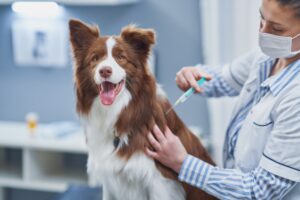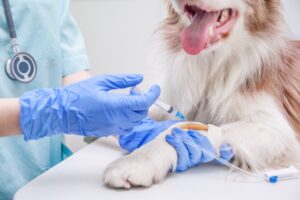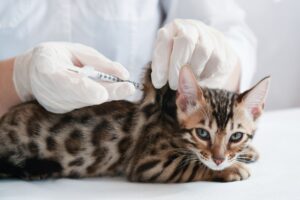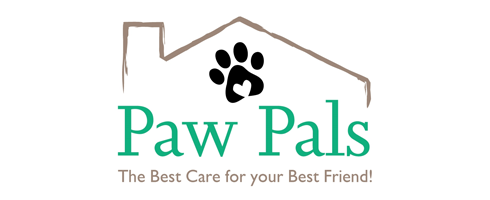Vaccinations play a crucial role in keeping your pets healthy and protecting them from life-threatening diseases. Just like in humans, pet vaccinations have become a topic of debate in recent years. However, the truth remains that certain vaccines are absolutely necessary for your pet’s well-being. Not only do they help prevent major illnesses, but they are often a requirement for boarding facilities, groomers, and even pet sitters.
So, which vaccinations should your pet receive? The answer depends on various factors such as their age, health status, lifestyle, and geographical location. Below is a guide to the most important pet vaccinations you should consider to keep your furry friend as healthy as possible.
Core Vaccinations for Dogs and Cats
Core vaccines are those that veterinarians highly recommend for all pets, as they protect against the most severe and easily transmitted diseases. Many of these vaccines are legally required in certain areas.
Rabies – Mandatory and Lifesaving
 Rabies is one of the most serious viral diseases, as it is almost always fatal once contracted. It affects the nervous system of mammals, including humans, and spreads through the bite of an infected animal. Rabies is a major public health concern, which is why many states and localities require both dogs and cats to receive rabies vaccinations.
Rabies is one of the most serious viral diseases, as it is almost always fatal once contracted. It affects the nervous system of mammals, including humans, and spreads through the bite of an infected animal. Rabies is a major public health concern, which is why many states and localities require both dogs and cats to receive rabies vaccinations.
- For Dogs: Puppies can receive their first rabies shot as early as 12–16 weeks. A booster is typically given one year later, and then every one to three years depending on the vaccine type and legal requirements in your area.
- For Cats: Kittens get their first rabies vaccine at 3–4 months, with booster shots similar to dogs.
This vaccination not only keeps your pet safe but also protects other pets, humans, and wildlife.
Distemper – A Deadly and Highly Contagious Virus
Distemper is a serious viral infection that affects both dogs and cats, with different forms of the disease in each species. This highly contagious disease spreads through saliva, urine, and even the air.
- Canine Distemper: This virus affects the respiratory, gastrointestinal, and nervous systems of dogs, often leading to fever, nasal discharge, seizures, and paralysis. Unfortunately, there is no cure for distemper, and the mortality rate is high.
- Feline Panleukopenia (Feline Distemper): Similar to canine distemper, this viral infection can be fatal to cats, causing fever, lethargy, and severe diarrhea.
Vaccines for distemper are usually part of combination vaccinations:
- For Dogs: Puppies receive a series of shots at 6, 9, 12, and 15 weeks, followed by an annual booster. The vaccine is often combined with others in a “DHPP” (Distemper, Hepatitis, Parvovirus, and Parainfluenza) shot.
- For Cats: Kittens start vaccines at six weeks, with repeat doses every 3-4 weeks until they are 16 weeks old. Regular boosters are given every 1–3 years.
Parvovirus (Dogs Only) – A Devastating Intestinal Illness
 Parvovirus is one of the most feared diseases among dog owners because of its high mortality rate. This virus attacks a dog’s digestive system, often causing severe vomiting, diarrhea, dehydration, and weakness. It spreads easily, particularly in environments with unvaccinated dogs.
Parvovirus is one of the most feared diseases among dog owners because of its high mortality rate. This virus attacks a dog’s digestive system, often causing severe vomiting, diarrhea, dehydration, and weakness. It spreads easily, particularly in environments with unvaccinated dogs.
- Puppies are especially vulnerable, and they can receive the parvovirus vaccine as early as 6–8 weeks, with follow-up doses later. This vaccine is usually included in the DHPP combination shot.
Hepatitis (Dogs Only) – Affects the Liver and Other Organs
Canine hepatitis is another deadly virus that primarily affects the liver but can also attack the kidneys, spleen, and eyes. Symptoms include fever, stomach pain, vomiting, and even permanent eye damage.
- The hepatitis vaccine is usually part of the DHPP combination shot for puppies and adult dogs.
Feline Herpesvirus and Calicivirus (Cats Only) – Common Respiratory Infections
These two viruses cause severe upper respiratory infections in cats. Cats infected with feline herpesvirus may show chronic sneezing, eye infections, and nasal congestion. Calicivirus can result in mouth ulcers and respiratory trouble.
- These vaccines are included in the FVRCP shot (Feline Viral Rhinotracheitis, Calicivirus, and Panleukopenia).
Feline Leukemia Virus (FeLV) – A Must for Outdoor Cats
Feline Leukemia Virus (FeLV) weakens a cat’s immune system and increases the risk of secondary infections, anemia, and certain cancers. Since this disease spreads through close contact with infected cats, outdoor and social cats are at higher risk.
- Kittens should receive their first FeLV vaccine at around eight weeks, with boosters given yearly for at-risk cats.
Non-Core (Optional) Vaccinations Based on Risk Factors
Beyond core vaccinations, additional vaccines may be recommended to protect pets with specific lifestyles or those living in particular regions.
Optional Vaccines for Dogs
- Bordetella (Kennel Cough): Required by many dog daycares and boarding facilities, this vaccine protects against a contagious respiratory infection that spreads through close contact.
- Leptospirosis: A bacterial infection that affects the kidneys and liver; most common in dogs exposed to wildlife or contaminated water.
- Lyme Disease: Recommended for dogs living in tick-prone environments.
- Canine Influenza (Dog Flu): An option for dogs frequently in shelters, boarding facilities, or dog parks.
- Rattlesnake Vaccine: Useful for dogs in snake-heavy areas as it may reduce the severity of a rattlesnake bite.
Optional Vaccines for Cats
 Feline Immunodeficiency Virus (FIV): Cat owners with outdoor cats may consider this vaccine, especially if their pets are prone to fighting.
Feline Immunodeficiency Virus (FIV): Cat owners with outdoor cats may consider this vaccine, especially if their pets are prone to fighting.- Feline Chlamydia Felis: Common among multi-cat households, this bacterial infection causes runny eyes and respiratory symptoms.
- Feline Bordetella: Necessary for cats that spend time in shelters or communal living spaces.
Why Staying Up-to-Date on Vaccinations Matters
Vaccinations are one of the easiest and most effective ways to prevent serious diseases in pets. The benefits include:
- Protecting Your Pet: Many of these diseases are deadly or can cause lifelong complications. Vaccination dramatically lowers the risk of illness.
- Preventing Disease Spread: A vaccinated pet helps prevent the spread of illnesses to other animals.
- Avoiding Costly Vet Bills: The cost of treating diseases like parvovirus or feline leukemia is far higher than getting a simple vaccination.
- Meeting Legal and Boarding Requirements: Rabies shots are often required by law, and other vaccines are a must for daycare, pet sitting, or boarding.
Talk to Your Vet About The Right Vaccination Plan
Your veterinarian can help determine the best vaccination schedule for your pet based on their lifestyle, medical history, environment, and age. Some pets need yearly boosters, while others may need shots every three years.
If you need help caring for your pet after a vaccination session or ensuring they are healthy and happy while you’re away, Paw Pals Pet Sitting offers trusted pet care services. Whether you need a reliable pet sitter or a safe home environment for your furry friend, we’ve got you covered.
Have questions about pet vaccinations? Contact us today to learn more about how we can help keep your pet safe and healthy!


